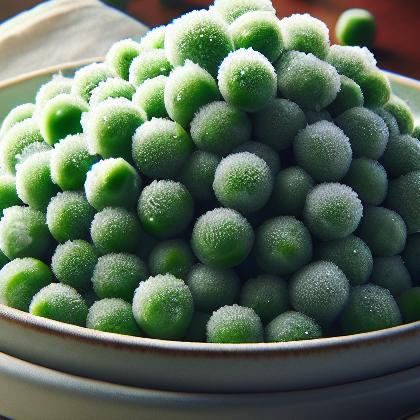Frozen Pea

The pea is most commonly the small spherical seed or the seed-pod of the pod fruit Pisum sativum. Each pod contains several peas. Peapods are botanically a fruit, since they contain seeds developed from the ovary of a (pea) flower. The name is also used to describe other edible seeds from the Fabaceae such as the pigeon pea (Cajanus cajan), the cowpea (Vigna unguiculata), and the seeds from several species of Lathyrus.P. sativum is an annual plant, with a life cycle of one year. It is a cool season crop grown in many parts of the world; planting can take place from winter to early summer depending on location. The average pea weighs between 0.1 and 0.36 grams. The immature peas (and in snow peas the tender pod as well) are used as a vegetable, fresh, frozen or canned; varieties of the species typically called field peas are grown to produce dry peas like the split pea shelled from the matured pod. These are the basis of pease porridge and pea soup, staples of medieval cuisine; in Europe, consuming fresh immature green peas was an innovation of Early Modern cuisine.The wild pea is restricted to the Mediterranean basin and the Near East. The earliest archaeological finds of peas date from the late neolithic era of current Greece, Syria, Turkey and Jordan. In Egypt, early finds date from ca. 4800–4400 BC in the Nile delta area, and from ca. 3800–3600 BC in Upper Egypt. The pea was also present in Georgia in the 5th millennium BC. Farther east, the finds are younger. Peas were present in Afghanistan ca. 2000 BC, in Harappa, Pakistan, and in northwest India in 2250–1750 BC. In the second half of the 2nd millennium BC, this pulse crop appears in the Gangetic basin and southern India.
Frozen pea Pairs With:

Frozen pea Properties:
| Food Property | Type | Description |
|---|---|---|
| Flavor Profile | Sweet | Frozen peas have a slight natural sweetness. |
| Texture | Firmness | Frozen peas are firm when cooked properly. |
| Moisture | Frozen peas contain some moisture, which is released when cooked. | |
| Nutritional Value | Fiber | Frozen peas are a good source of dietary fiber. |
| Micronutrients | Frozen peas are rich in vitamins and minerals, such as vitamin C and vitamin K. | |
| Color | Natural Pigments | Frozen peas have a vibrant green color due to their natural pigments. |
| Aroma | Volatile Compounds | Frozen peas have a fresh and slightly grassy aroma when cooked. |
| Cooking Behavior | Heat Conductivity | Frozen peas cook quickly and evenly due to their small size. |
| Water Retention | Frozen peas retain their shape and texture when cooked properly. |
Food Pairing App - Version 1.2.0
